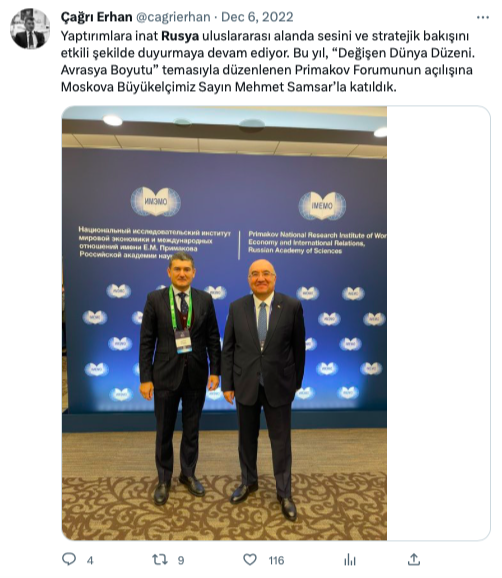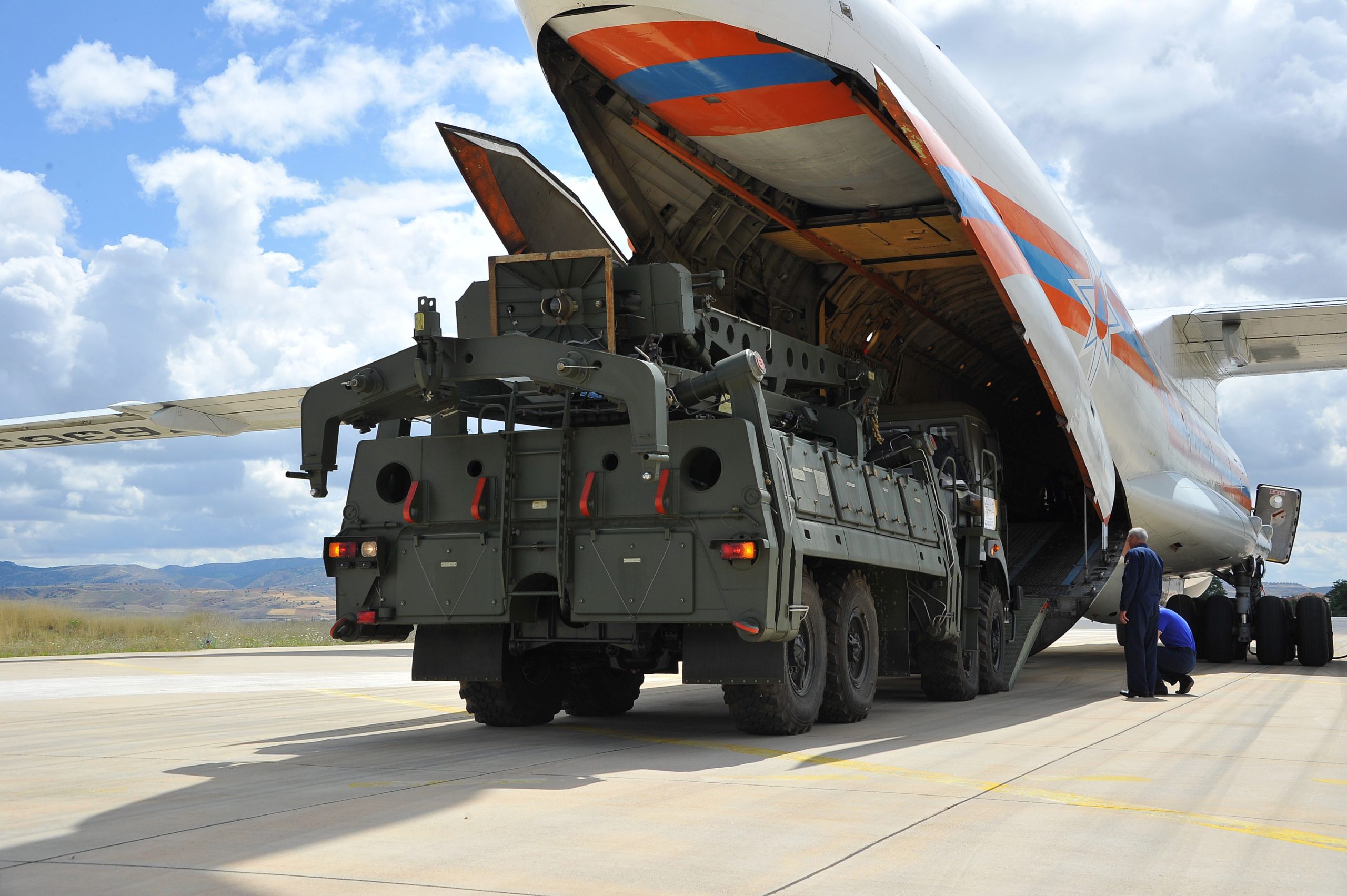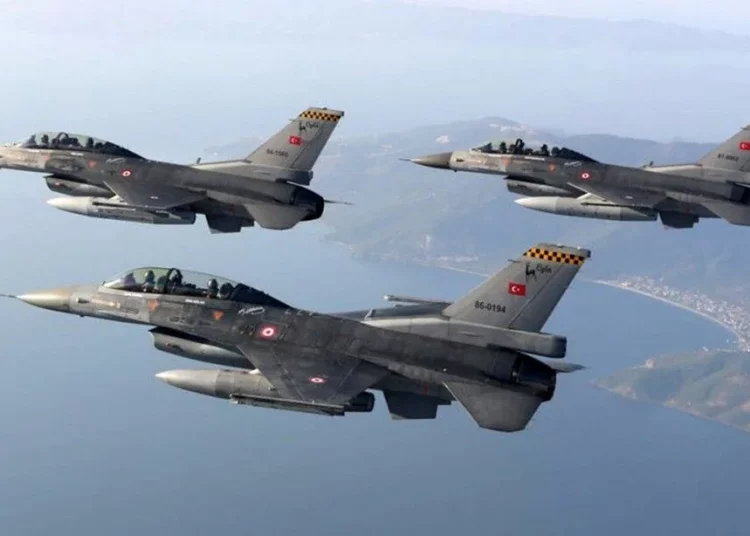Levent Kenez/Stockholm
A member of Turkey’s Presidential Security and Foreign Policy Council said it’s high time for Turkey to stop purchasing American weapons, claiming that Turkey is not obliged to buy F-16 aircraft from the United States nor does it need to.
The US administration excluded Turkey from the F-35 striker jet program in 2021 because Ankara had purchased a Russian S-400 missile system. Instead, Turkey has set its sights on another aircraft and is currently in talks with the US to purchase 40 Lockheed Martin F-16 fighter jets and 79 modernization kits to upgrade its outdated F-16 fleet.
Çağrı Erhan, President Recep Tayyip Erdoğan’s advisor on security and foreign policy, first wrote on Twitter on January 20 that it is high time for Turkey to close the book on American weapons in defense industry procurement and that the US can sell F-16s to whomever it wants. Erhan also added that Turkey is neither obligated to buy nor in need of F-16s, which he claimed were not among the top 10 best fighter aircraft in the world.

Erhan, the rector of Altınbaş University, which is owned by a businessman close to Erdoğan, later wrote a column in the pro-government Türkiye daily stating that Ankara was unrightfully removed from the F-35 program. He claimed that Turkey was compelled to purchase the S-400 missiles after the US refused to sell them the Patriot missile defense system. He also said Turkey does not have to purchase the F-16s simply because it can’t procure F-35s.
Erhan shared similar thoughts during a program on TVnet, a pro-Erdoğan media outlet, on Saturday.
“We don’t need anyone’s F-16s. There are still people in our military who are not aware of this. This is called strategic habit. In 1947, when American weapons were gifted as part of the Truman Doctrine, our air force did not have anything at all. There was a Soviet threat, and Turkey adhered to the doctrine. This created a dependency in the sequel.”
Stating that there are no non-American-made aircraft in Turkey’s inventory, except for a few transport aircraft, Erhan said this was a strange situation. According to Erhan, the idea of purchasing warplanes from other NATO countries in the past did not materialize since the Turkish military rejected it on the grounds that its pilots had received F-16 training and that it would take a long time to adapt to other fighter aircraft systems.
Arguing that Turkey should diversify its resources in the defense industry and give priority to domestic production, he claimed that the US in the past had imposed the condition that the attack helicopters it planned to sell to Turkey not be used in the fight against terrorism in the Southeast. He also said the US had failed to donate several frigates to Turkey despite its promise to do so.
Erhan believes NATO candidate Sweden is far from convincing Turkey of approving its NATO membership and that the recent Quran burning outside the Turkish embassy in Stockholm should not be normalized with the claim that it was carried out by a lunatic or an extremist, adding that Sweden is responsible.
Contrary to popular opinion, he is also against Finland’s NATO membership for the time being. “Has Finland fulfilled its commitments so that when we say ‘No’ to Sweden, we will say ‘Yes’ to them? When they keep their word, then they’ll become NATO members,” he tweeted.

However, despite Erhan’s opposition, the Turkish government insists on buying F-16s from the United States, with the most important reasons being the aging of Turkey’s f-16 fleet and the excess number of of aircraft in need of modernization.
Mesut Hakkı Caşın, the president’s other advisor on security and foreign policy, previously stated that the balance of power between Turkey and Greece had changed following Western military assistance to Athens, adding that the Turkish military’s job has become more difficult. A former air force officer, Caşın also said air superiority has passed to Greece following its purchase of new fighter jets.
The Biden administration is preparing to ask Congress to approve the sale of 40 F-16 fighter jets to Turkey, after weighing a Turkish request for the planes for more than a year, US media reported last week. If approved, the sale would be among the largest arms sales in years.
It is unknown whether the US Congress will approve Turkey’s request given the anger towards Erdoğan over many issues. Turkey must not activate the S-400 system and not purchase a second batch of missiles, which would be a first step toward breaking the resistance of Congress.
A report published by the Foundation for Political, Economic and Social Research (SETA), the government-funded propaganda think tank of Turkey’s ruling party, in February 2020 states that the diplomatic and military balance between Greece and Turkey has deteriorated to the disadvantage of Turkey and that it would be best for Ankara to abandon the purchase of a second batch of S-400 missiles from Russia in order to strike a delicate balance in bilateral relations.
While the Turkish government claims that it was right to purchase the S-400 missile system, it has refrained from giving information about whether it was activated or not. Nordic Monitor previously reported that Turkey put the long-range missile system in a storage facility so as not to risk further US sanctions.

The United States claims that once the S-400 system is activated in Turkey, it will start collecting data on NATO warfare systems and the US-made fighter jets Turkey has.
Meeting with his US counterpart Antony Blinken in Washington on January 18, Turkish Foreign Minister Mevlüt Çavuşoğlu said Turkey’s F-16 request and Sweden and Finland’s NATO membership are not related and that the US Congress should not portray them as such. There were reports that Blinken told the Turkish side that if the Turkish block of Sweden and Finland’s NATO membership is not removed, no progress can be made on the issues between the two NATO allies.












